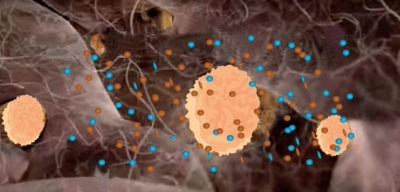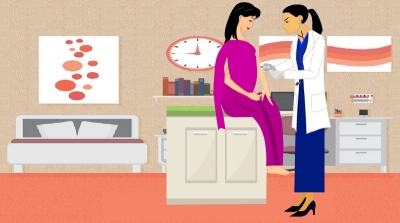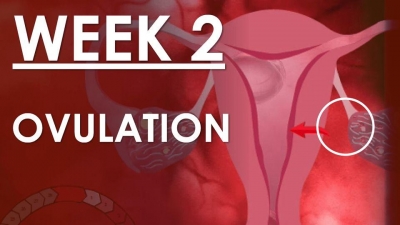The ovaries may develop numerous small collections of fluid (follicles) and fail to regularly release eggs. Because of the presence of such immature follicles which are filled with fluid in the ovaries, this condition is called poly (many) cystic ovarian disease. Ovary usually produces female hormones, estrogen, and progesterone during the menstrual cycle. It also produces some amount of androgens. As Ovary is effected in this condition, there is an imbalance in these hormones. This imbalance leads to irregular menstrual cycles and other symptoms and signs of PCOD.
So what are the signs and symptoms of PCOD?
- Infrequent, irregular or prolonged menstrual cycles. Some cycles may have excessive bleeding.
- Elevated levels of the male hormone may result in physical signs, such as excess facial and body hair (hirsutism), and occasionally severe acne and male-pattern baldness.
- Many cysts in the ovary
What are the reasons for PCOD?
- Excess insulin - Obesity can cause insulin resistance in the body i.e the cells in the body may develop resistance to insulin and because of this the cells may not be able to utilize the sugars presented to them and the sugar remains in the blood and this causes further release of insulin and increased quantity of insulin in the blood stimulates the production of androgens ( male hormones ). This, in turn, will cause difficulty for these women to ovulate.
- Heredity
- Excess production of androgens by the ovaries can lead to anovulation ( failure to ovulate)
- Stress - Stress causes the release of cortisol hormone. Cortisol and progesterone have the same receptors. Thus they compete with each other. Increase in cortisol can cause the decreased function of progesterone, leading to PCOD.
- High cortisol also causes an increase in your blood sugar level, which may, in turn, cause an over-production of insulin. High insulin levels may lead to insulin resistance and production of androgens (male hormones) and thus worsen PCOS symptoms.
Complications of PCOD
- Infertility
- Gestational diabetes or pregnancy-induced high blood pressure
- Miscarriage or premature birth
- Type 2 diabetes or prediabetes
- Sleep apnea
- Depression, anxiety and eating disorders
- Abnormal uterine bleeding
What happens in PCOD?
Women with PCOD do not get regular periods as their ovaries do not ovulate and for periods to occur, progesterone hormone is needed which is produced by the ovary after ovulation i.e in the second half of the menstrual cycle. During regular periods, the increasing concentration of progesterone in the second half of the menstrual cycle causes the lining of the uterus to thicken. If fertilization does not occur, the ovary stops its elevated production of both estrogen and progesterone. The sudden fall in the concentrations of these hormones causes shedding of the blood-rich uterine lining and bleeding (menstruation). But in women with PCOD, there is increased estrogen production, which causes the follicles to begin to mature and many follicles migrate to the periphery of the ovary, but they do not ovulate and thus, there is no progesterone production. The lack of progesterone is detected by the hypothalamus, in the brain, which continues to try to stimulate the ovary by increasing its production of GnRH, which increases the pituitary production of FSH and LH. This stimulates the ovary to make more estrogen and androgens, which stimulates more follicles toward ovulation. If these additional follicles are also unable to produce a matured ovum or make progesterone, the menstrual cycle is dominated by increased estrogen and androgen production without progesterone. This is the fundamental problem with PCOD.
Diagnostics and Treatment
There is no definitive test for PCOD. Diagnosis is usually made correlating clinical symptoms with blood tests, Pelvic examination. You may also be tested for blood sugar, cholesterol, insulin, and triglyceride levels. An ultrasound is done. Presence of many abnormal follicles which are fluid-filled in the ovary can point to PCOD.
Treatment begins with lifestyle changes.
Obesity is one of the causes of PCOD, as there is increased insulin production in these individuals. Increased insulin releases androgens which is the cause of anovulation. Losing weight can increase the effectiveness of the treatment of PCOD. Regular exercise, healthy diet and stress management are essential for success of treatment. Stress management is very important due to the reason explained earlier
Doctors usually start with treating patients with small doses of progesterone. Supplementing with progesterone in the latter half of menstrual cycle will cause the breakthrough bleeding similar to a regular period.
Medications
To regulate your menstrual cycle, your doctor might recommend:
Combination birth control pills. Pills that contain estrogen and progestin decrease androgen production and regulate estrogen. Regulation of hormones can help in regularizing your menstrual cycle. It can also lower risk of endometrial cancer and excess hair growth and acne.
Progestin therapy. Taking progestin for 10 to 14 days every one to two months can also help in regulating the menstrual cycle.
Some medications are also used if you are planning to pregnancy to induce ovulation -
Clomiphene - This oral anti-estrogen medication is taken during the first part of the menstrual cycle.
Metformin - This oral medication for type 2 diabetes improves insulin resistance and lowers insulin levels. This medication is added to clomiphene therapy sometimes to increase the chances of ovualtion. In prediabetes, metformin can also slow the progression to type 2 diabetes and help with weight loss.





